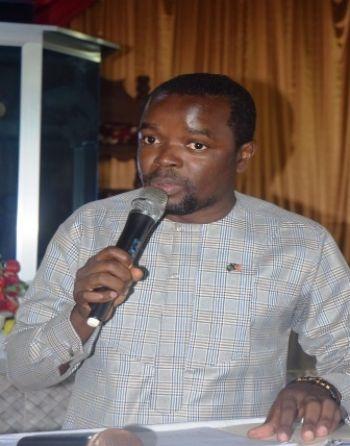"We Don’t Create Jobs In the Public Sector"

Deputy Minister Wilfred Bangura of the Ministry of Commerce and Industry.
... Says Deputy Minister Wilfred Bangura from the Ministry of Commerce
A senior official of the administration of President George Weah has reminded the government of the need to implement robust policies to spurn economic growth and job creation in the private sector.
The official, who works at the Ministry of Commerce and Industry, noted that a bigger private sector can accelerate wealth creation and can elevate the standard of living. Deputy Minister Wilfred Bangura of the Ministry of Commerce noted that governments in developing countries such as Liberia can only do better when the private sector is prosperous and successful.
“We do not create jobs in the public sector. Jobs are created in the private sector. Anyone who tells you that there is wealth in the public sector for any individual benefit, that person is a liar,” noted Deputy Min. Bangura, who heads the Ministry’s Central Administration.
He added: “If so, it is only through corruption, but that is harmful and terrible for the doer and the country. Government does not create jobs but ensures there is an enabling environment for the private sector to flourish.”
Min. Bangura added that the Weah-led government should hook into the private sector more to accommodate many people in the job market.
“People can tell you how many jobs there are in the government but not in the private sector. They are limitless in the private sector," Bangura noted. “This is why we should consider the private sector as the main source of poverty reduction. It should go across the ecosystem of the government for development and growth."
“Successful companies are usually investing more, generating profits, paying salaries, and taxes. But if they do not have the enabling environment created by the government, it becomes difficult for a country to generate enough money to develop infrastructures and improve systems, including the education of its citizens,” Bangura noted.
The Deputy Commerce Minister made the remark recently at the Public Procurement and Concessions Commission (PPCC)’s third annual forum. He spoke on the theme “Private Sector Engagement: Empowering Business for Competition.”
In his remarks, Bangura reminded the government that small businesses are the engines for growth, "The best approach to spur growth is to work through small businesses."
The acting Commerce Minister was particular when he made mention of the Ever Green Recycling Institute (EGRI), a Liberian-owned waste management and recycling micro-company that is producing gasoline, fuel, construction bricks, among several other things through the use of plastic trash.
“We have done our best through some international support programs to allow this small but productive company access money to continue with the production,” he said. “We are glad that they have always used donor funds coming in grants to achieve some specific goals. More of EGRI are needed to help clean our streets of waste. More jobs come through their work, too.”
He said there is some money available in the 2022 Fiscal budget for loans to small businesses so they can grow, expand, and accommodate more workers who, in turn, will be able to put food on their tables through an organized income, no matter how little it may be.
Meanwhile, Bangura pointed out that small businesses are not allowed to participate in international competitions and, as such, to have more Liberian businesses rise to the scene, they need support to leave from the informal sector to the formal sector.
“Not many of our Liberian businesses are registered with the Liberia Business Registry (LBR), nor are they paying taxes. They are small in size and are not generating much to contribute to the national development drive. This is why the government is now trying to help a number of them grow and expand appreciably,” Bangura disclosed.
He concluded that the reason the government is not doing business with many Liberian-owned businesses is that they are not legally operating and cannot participate in bidding processes as provided for in the Public Procurement and Concessions Commission Law.
